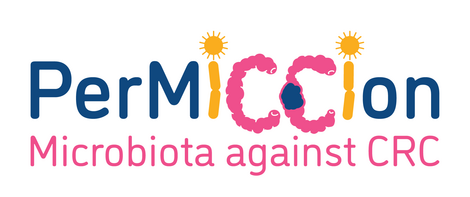PerMiCCion: Personalized Microbiome-Based Approaches to Early Onset Colorectal Cancer Prevention, Diagnosis and Management
Aims of this project
Over the last decades, the incidence of colorectal cancer (CRC) in young adults has increased at an alarming rate. Global Westernization of diets, synthetic food dyes, physical inactivity and sedentary behavior, have been identified as key risk factors. The gut microbiota is at the intersection of early onset CRC and those risk factors and can be seen as a dynamic living sensor of any change in the human body. Therefore, leveraging recent advances in next generation sequencing can lead to novel microbiome-based prophylactics, diagnostics and therapeutics against CRC in young adults.
To achieve our scientific goals, we have formed a strategic research alliance in PerMiCCion of world-leading scientists with complementary background: Colorectal cancer, cancer and nutritional epidemiology, molecular oncology, metagenomics and medical informatics.
For more information, have a look at the official website.

Contribution of the Department of Medical Bioinformatics
Subproject 2: Unravelling the tumor microbiome and mycobiome and its implication for oncogenic signaling (Workpackage 2 and 3)
PI: Prof. Dr. Annalen Bleckmann (Dep. Medicine A – Hematology, Oncology and Pneumology, University Hospital Münster (UHM)
PI: Prof. Dr. Tim Beißbarth (Department of Medical Bioinformatics, University Medical Center Göttingen)
Recent studies have shown that malignant tumors are inhabited by bacteria and fungi, which affect tumor proliferation, progression and therapy response. Subproject’s 2 goal is to perform a comprehensive characterization of the tissue micro- and mycobiome of young CRC patients, identify the oncogenic microbiome signature and understand its influence on oncogenic signaling resulting in tumor development and progression.
In work package 2 (RNA sequencing and DNA methylation), genome-wide DNA methylation and host RNA sequencing analyses of tumour tissues will be used to identify microbiota-sensitive epigenetic and transcriptomic signatures and to study how invasion by microbiota affects signalling pathways within cancer cells as well as inflammatory processes and immune responses.
Aims:
(1) Identify candidate genes involved in inflammatory and immune responses;
(2) Identification of common signalling pathways and master regulators;
(3) Develop a combinatorial ML model to classify tumour and healthy tissue in young adult colorectal cancer.
Work package 3 (Confirm microbiome-associated oncogenic signalling in vitro and ex) will validate the identified microbiome-associated signalling pathways and master regulators in patient samples by immunohistochemistry and in colorectal cancer cell lines.
Aims:
(1) To gain insights into the relationship between bacterial- and fungal-associated signalling pathways in the tumour and clinicopathological features in early-onset colorectal cancer and.
(2) To compile a list of tumour regulators that are influenced by the microbiome and to formulate hypotheses on the mechanistic effects.
At UMG, the coordination and execution of the bioinformatics work, processing of the RNA sequence data, modelling of DNA methylation with bacteria and fungi, analysis of the master regulators and machine learning as well as the integration with the corresponding patient data will be undertaken for this purpose.
Coordination and Project partners
Coordination:
Assoc. Prof. Gianni Panagiotou
Leibniz Institute for Natural Product Research and Infection Biology
Hans Knöll Institute, Jena
Project partners:
Prof. Ute Nöthlings
Unit of Nutritional EpidemiologyDepartment of Nutrition and Food Sciences
University of Bonn
Dr. Biljana Gigic
Department of General, Visceral and Transplantation Surgery
University of Heidelberg
Prof. Annalen Bleckmann
University Hospital Münster
Medical Clinic A – Hematology, Oncology
Prof. Tim Beissbarth
Department of Medical Bioinformatics
University Medical Center Göttingen
Prof. Karin Michels
Institute for Prevention and Cancer Epidemiology
University Medical Center Freiburg
That might also interest you